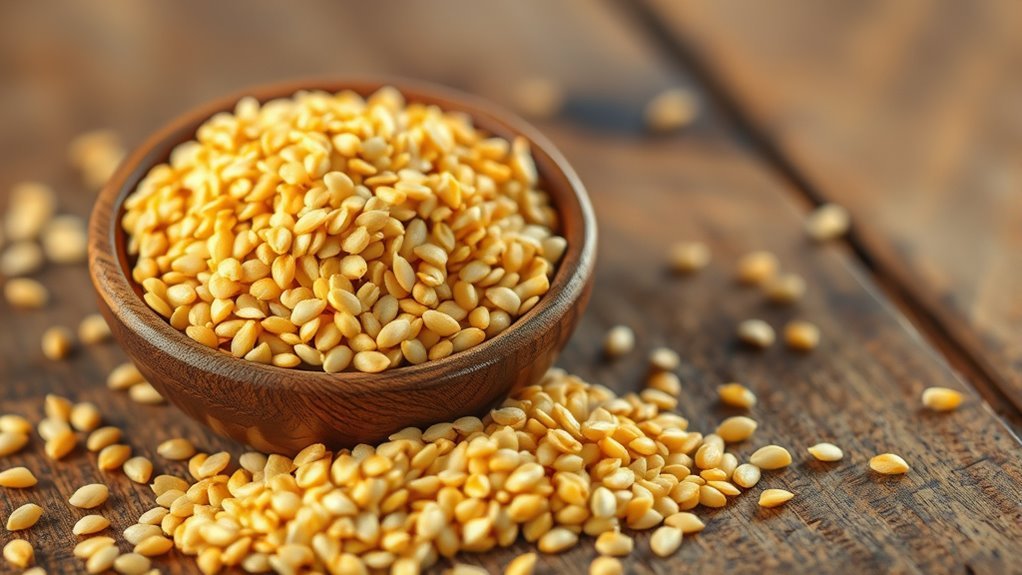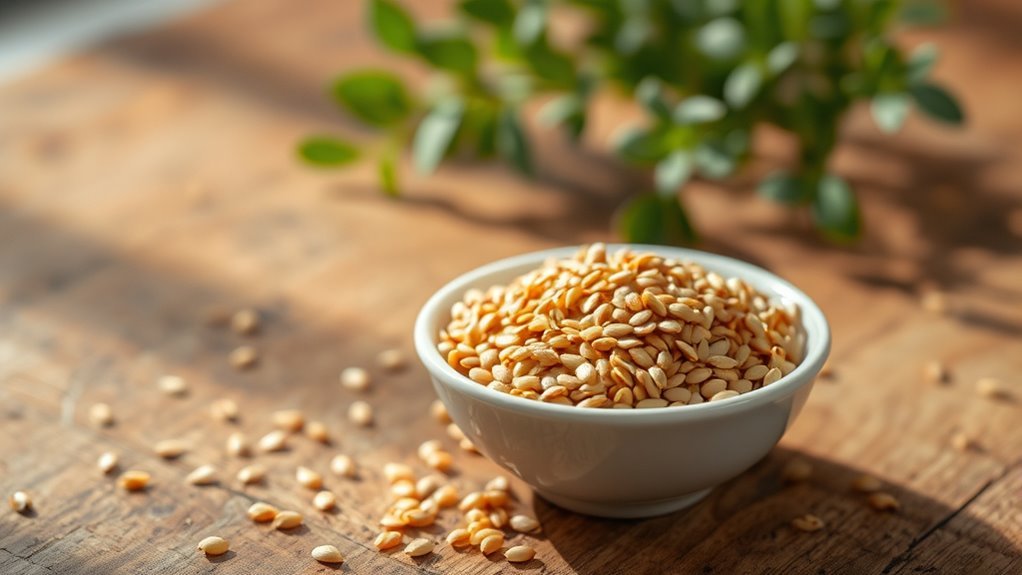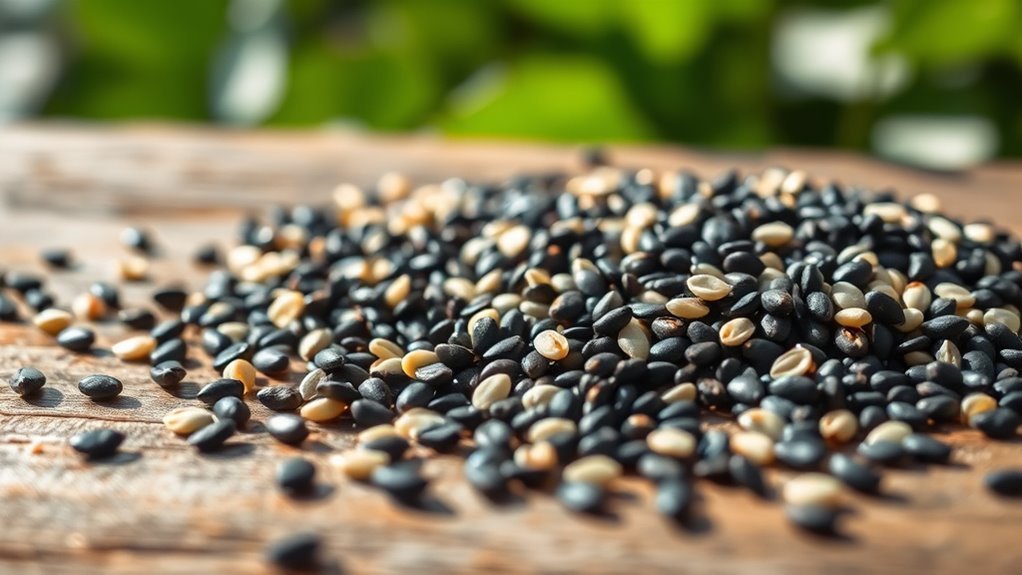Yes, sesame seeds are keto-friendly! With about 3 grams of net carbs per ounce, they’re a great option for your low-carb diet. They provide healthy fats, protein, and essential nutrients like calcium and magnesium. Incorporating sesame seeds into salads, dressings, or as a topping can enhance your meals while supporting your dietary goals. However, keep in mind potential allergies or digestive issues. Discover how to make the most of sesame seeds in your keto journey!
Nutritional Overview of Sesame Seeds

When it comes to evaluating the nutritional profile of sesame seeds, you’ll find they’re packed with essential nutrients that can complement a ketogenic diet. Originating from Africa and India, sesame seeds have been cherished for centuries, both for their flavor and health benefits. They’re rich in healthy fats, protein, and fiber, making them an excellent addition to various dishes. You can sprinkle them on salads, blend them into sauces, or incorporate them into baking. Their culinary uses are vast, enabling you to enjoy their nutty taste while benefiting from their nutrient density. This versatility not only enhances your meals but also supports your dietary goals, allowing you to embrace a lifestyle that celebrates both flavor and health.
Carbohydrate Content in Sesame Seeds

Understanding the carbohydrate content in sesame seeds is essential for anyone following a ketogenic diet. These tiny seeds pack a surprising nutritional punch, containing around 7 grams of carbohydrates per ounce. However, don’t forget about their fiber content; about 4 grams of that total is fiber, which can help offset the net carbs. This means sesame seeds contribute roughly 3 grams of net carbs per ounce, making them a more suitable option for your keto journey than many other seeds. Additionally, the calorie count for this serving is around 160 calories, so you’ll want to factor that into your daily intake. Ultimately, sesame seeds can be a flavorful addition to your meals while keeping your carb levels in check.
Health Benefits of Sesame Seeds

Sesame seeds pack a powerful nutrient density profile, offering healthy fats, protein, and essential vitamins and minerals. They also contain antioxidants that can help combat oxidative stress in your body, contributing to overall wellness. Additionally, research suggests that incorporating sesame seeds into your diet may support heart health by improving cholesterol levels and reducing inflammation.
Nutrient Density Profile
Although often overlooked, sesame seeds boast a remarkable nutrient density profile that can offer numerous health benefits. These tiny seeds pack a punch with their rich array of vitamins and minerals. When considering different sesame varieties and seed sourcing, you’ll find they’re excellent sources of calcium, magnesium, and iron, vital for bone health and overall well-being.
| Nutrient | Amount per 100g | Benefits |
|---|---|---|
| Calcium | 975 mg | Supports bone health |
| Magnesium | 351 mg | Aids in muscle function |
| Iron | 14.55 mg | Essential for blood production |
| Protein | 18 g | Important for muscle repair |
Including sesame seeds in your diet can enhance your nutrient intake, promoting a healthier lifestyle.
Antioxidant Properties
Packed with powerful antioxidants, sesame seeds can play a significant role in protecting your body from oxidative stress. These tiny seeds contain antioxidant compounds like sesamolins and sesamin, which help combat free radicals and reduce cellular damage. Incorporating sesame seeds into your diet can offer various health benefits, including improved immune function and reduced inflammation. Studies suggest that these antioxidant properties may also support skin health and contribute to overall well-being. By adding sesame seeds to salads, smoothies, or snacks, you can easily harness their protective effects. So, if you’re looking for a delicious way to boost your antioxidant intake, sesame seeds might just be the perfect addition to your keto lifestyle.
Heart Health Benefits
If you’re looking to enhance your heart health, incorporating sesame seeds into your diet could be a smart choice. These tiny seeds are rich in healthy fats, fiber, and antioxidants, which can contribute to better cardiovascular health. Research suggests that sesame seeds may help reduce cholesterol levels, a significant risk factor for heart disease. They contain compounds like sesamin and sesamolins, which have been shown to lower bad cholesterol while potentially raising good cholesterol. Additionally, their anti-inflammatory properties can further support heart function. By adding sesame seeds to salads, smoothies, or snacks, you not only enjoy their nutty flavor but also take a proactive step toward a healthier heart. So why not give them a try?
Comparing Sesame Seeds With Other Seeds
When comparing sesame seeds with other seeds, you’ll find notable differences in their nutritional profiles and carbohydrate content. For instance, while sesame seeds are rich in healthy fats and protein, some seeds like pumpkin and chia may have lower carbohydrate counts, making them more favorable for a keto diet. Understanding these distinctions can help you make informed choices based on your dietary goals.
Nutritional Profile Comparison
While sesame seeds are often celebrated for their unique flavor and health benefits, comparing their nutritional profile with that of other seeds can provide a clearer picture of their role in a keto diet. Sesame seed varieties, like black, white, and hulled seeds, each offer distinct nutrient profiles, but they generally provide healthy fats, protein, and essential minerals. In contrast, seeds like chia and flax are higher in fiber, which can be beneficial for digestion. When considering keto diet integration, sesame seeds can add valuable nutrients and fats, but balancing them with other seeds may enhance your overall intake. Ultimately, understanding these differences helps you make informed choices for a satisfying, ketogenic lifestyle.
Carbohydrate Content Analysis
Although sesame seeds are a popular option in many diets, their carbohydrate content can greatly influence their suitability for a ketogenic lifestyle. With about 7 grams of carbs per ounce, sesame seeds might not be the best choice if you’re aiming for a strict keto diet. In comparison, seeds like chia and flaxseed offer lower carbohydrate sources, with only 1-2 grams per ounce. This difference is significant for maintaining nutritional balance while adhering to keto guidelines. If you’re looking to incorporate seeds into your meals, it’s essential to take these carb counts into account. Ultimately, choosing seeds with lower carbs can help you enjoy a wider variety of foods while staying true to your dietary goals.
How to Incorporate Sesame Seeds Into a Keto Diet
Incorporating sesame seeds into your keto diet can be both simple and enjoyable, as they offer a nutty flavor and a satisfying crunch along with healthy fats. You can sprinkle sesame seeds on salads or roasted vegetables to add texture and enhance flavor. Consider using them in keto meal ideas like cauliflower rice stir-fries or as a topping for grilled meats. Their high magnesium content and other sesame seed benefits can support your overall health, making them a great addition to your meals. You can also blend sesame seeds into homemade keto-friendly sauces or dressings for an extra kick. With various ways to enjoy them, sesame seeds can easily fit into your low-carb lifestyle.
Sesame Seed Oil and Its Keto Compatibility
Sesame seed oil, known for its rich flavor and high smoke point, can be a valuable addition to your keto diet, especially when you’re looking for healthy fats. This oil is derived from sesame oil extraction, which preserves its beneficial nutrients, including antioxidants and healthy fatty acids. In keto cooking, sesame oil adds depth to your dishes while fitting your low-carb lifestyle. It’s perfect for stir-frying, salad dressings, or drizzling over roasted vegetables. With about 14 grams of fat per tablespoon and minimal carbs, it aligns well with keto principles. Plus, its versatility makes it easy to incorporate into various recipes, giving you the freedom to enjoy flavorful meals without compromising your dietary goals.
Potential Health Risks of Sesame Seeds
While sesame seeds can offer numerous health benefits, it’s important to be aware of potential health risks associated with their consumption. Some individuals may experience allergic reactions to sesame seeds, which can range from mild symptoms like hives to severe anaphylaxis. If you have a known allergy, it’s essential to avoid them entirely. Additionally, consuming large quantities of sesame seeds can lead to digestive issues, such as bloating or gas, due to their high fiber content. Moderation is key to enjoying their nutritional benefits while minimizing risks. Always listen to your body and consult a healthcare professional if you have concerns about how sesame seeds might affect you personally. Enjoying freedom in your dietary choices means staying informed and cautious.
Sesame Seeds in Keto Recipes
Sesame seeds can be a nutritious addition to your keto recipes, thanks to their healthy fat content and protein. With a low carbohydrate count, they fit well into various dishes, enhancing both flavor and texture. You can easily incorporate them into salads, dressings, or as a topping for meats to boost your meals while staying within your carb limits.
Nutritional Profile Overview
Nuts and seeds often play an essential role in a ketogenic diet, and sesame seeds are no exception. They pack a powerful nutritional punch, making them a great addition to your keto recipes. Here are some sesame benefits you’ll appreciate:
- Healthy Fats: Rich in polyunsaturated and monounsaturated fats.
- Protein: A good source of plant-based protein, supporting muscle health.
- Vitamins & Minerals: High in calcium, magnesium, and iron, essential for overall well-being.
- Antioxidants: Contains sesamolins and sesamin, which may help reduce oxidative stress.
When exploring different seed varieties, sesame seeds stand out for their unique flavor and versatility. They can easily enhance your meals while keeping you aligned with your keto goals.
Incorporating Into Dishes
When looking to add variety to your keto meals, sesame seeds offer a versatile ingredient that can elevate both flavor and nutrition. You can sprinkle them on salads or incorporate them into a homemade sesame dressing for a delicious, low-carb option. Try creating seed snacks by roasting sesame seeds with your favorite spices for a crunchy treat that keeps your macros in check. They’re also great for enhancing dishes like stir-fries or as a topping for grilled meats. By including sesame seeds, you not only boost the taste but also add healthy fats and protein, making your keto journey more enjoyable. So, don’t hesitate to experiment and find creative ways to enjoy this nutritious seed!
Portion Control and Serving Suggestions
Although incorporating sesame seeds into a keto diet can be beneficial due to their low carbohydrate content, portion control is essential to maintain your macronutrient balance. To enjoy sesame seeds without overdoing it, consider these portion sizes and serving ideas:
- Sprinkle 1 tablespoon on salads for added crunch.
- Use 2 teaspoons in dressings or marinades for flavor.
- Mix 1 tablespoon into keto-friendly bread or muffin recipes.
- Add 1 tablespoon to smoothies for a nutty flavor.
Personalizing Your Keto Journey With Sesame Seeds
Incorporating sesame seeds into your keto diet can be a delicious way to enhance your meals while still adhering to your macronutrient goals. These tiny powerhouses are packed with healthy fats, protein, and essential nutrients, making them a great addition to your diet. You can try different sesame seed varieties, like white, black, or toasted, to discover what you love most. Use them in keto meal ideas such as salads, stir-fries, or as a crunchy topping for roasted vegetables. Tailor your approach by considering your personal preferences, whether you enjoy a nutty flavor or a subtle crunch. Embrace the sesame seed benefits while enjoying the freedom to create meals that satisfy both your taste buds and dietary needs.
Frequently Asked Questions
Can Sesame Seeds Trigger Allergies in Some Individuals?
You might think sesame seeds are harmless little powerhouses, but for some, they can release a storm of allergy symptoms! Yes, sesame allergies are real and can trigger reactions ranging from mild hives to severe anaphylaxis. If you’ve ever felt like your body’s in a wrestling match after munching on them, you’re not alone. Always consult a healthcare professional if you suspect an allergy to guarantee you’re making safe choices for your health.
Are There Any Nutritional Differences Between White and Black Sesame Seeds?
When looking at the nutritional comparison between white and black sesame seeds, you’ll find both are rich in healthy fats, protein, and minerals. However, black sesame seeds often have a slightly higher antioxidant content, enhancing their flavor profile. While the differences are minor, you might prefer one over the other based on taste or nutritional benefits. Exploring both can add variety to your diet while keeping those health goals in check.
How Should Sesame Seeds Be Stored for Optimal Freshness?
Wondering how to keep your sesame seeds fresh? For the best storage, place them in an airtight container away from light and humidity. A cool, dark pantry works wonders. If you want to extend their shelf life, consider refrigerating or freezing them. Just remember to let them come to room temperature before using. Following these freshness tips will guarantee your sesame seeds maintain their flavor and nutritional value longer, giving you that freedom in your cooking!
Can Sesame Seeds Be Consumed Raw or Do They Need to Be Cooked?
You can definitely consume sesame seeds raw, and they offer several raw benefits, like retaining more nutrients and healthy fats. However, cooking methods such as toasting can enhance their flavor and make them easier to digest. Each approach has its perks; raw seeds pack a nutritional punch, while toasted seeds can add a delightful crunch to dishes. Ultimately, it’s all about your preference and how you enjoy incorporating them into your diet.
Do Sesame Seeds Contain Anti-Nutrients That Affect Mineral Absorption?
Imagine munching on tiny seeds that supposedly hold the key to health, yet they might just be a sneaky thief in disguise. Sesame seeds do contain anti-nutrients, like phytic acid, which can impact mineral absorption. While it sounds alarming, moderation is key. If you balance your diet, the effects are minimal, and you can still enjoy their benefits without feeling imprisoned by their potential downsides. Freedom in your food choices is essential!
Frequently Asked Questions about Sesame Seeds and Keto
1. Are sesame seeds keto-friendly?
Yes, sesame seeds are considered keto-friendly. They are low in carbohydrates and high in healthy fats, making them a suitable addition to a ketogenic diet. One tablespoon of sesame seeds contains approximately 1-2 grams of net carbs, which fits well within the daily carb limit for those following keto.
2. What nutritional benefits do sesame seeds offer on a keto diet?
Sesame seeds are rich in nutrients, including healthy fats, protein, fiber, and essential minerals like calcium, magnesium, and iron. They also contain antioxidants and compounds that may help lower inflammation. Incorporating sesame seeds into your keto meals can enhance nutrient intake while keeping carbs low.
3. How can I incorporate sesame seeds into my keto meals?
There are various ways to include sesame seeds in your keto meals. You can sprinkle them on salads, use them as a topping for grilled meats or fish, blend them into smoothies, or add them to low-carb baked goods. Sesame oil, derived from sesame seeds, can also be used in salad dressings and marinades for added flavor.
4. Can sesame seeds help with weight loss on a keto diet?
Yes, sesame seeds can support weight loss on a keto diet due to their high fiber content, which promotes satiety and can help reduce overall calorie intake. Additionally, the healthy fats in sesame seeds can help maintain energy levels and keep you feeling full longer, making it easier to adhere to a keto lifestyle.
5. Are there any downsides to eating sesame seeds on a keto diet?
While sesame seeds are nutritious, they should be consumed in moderation, as they are calorie-dense. Overeating sesame seeds can lead to exceeding your daily calorie limit, which may hinder weight loss efforts. Additionally, some individuals may have allergies to sesame seeds, so it’s important to ensure you do not have any adverse reactions before incorporating them into your diet.
References
- https://en.wikipedia.org/wiki/Sesame_seed
- https://www.ncbi.nlm.nih.gov/pmc/articles/PMC6520887/
- https://www.healthline.com/nutrition/sesame-seeds-benefits
- https://www.medicalnewstoday.com/articles/325201
- https://www.ncbi.nlm.nih.gov/pmc/articles/PMC6836794/
- https://www.bbc.co.uk/food/sesame_seeds
- https://www.sciencedirect.com/science/article/pii/S2352938518300724
- https://www.fda.gov/food/food-labeling-nutrition/food-labeling-guide


